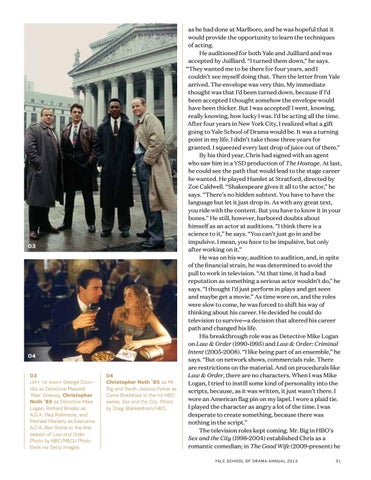03
04 03 left to right George Dzundza as Detective Maxwell ‘Max’ Greevey, Christopher Noth ’85 as Detective Mike Logan, Richard Brooks as A.D.A. Paul Robinette, and Michael Moriarty as Executive A.D.A. Ben Stone in the first season of Law and Order. Photo by NBC/NBCU Photo Bank via Getty Images.
04 Christopher Noth ’85 as Mr. Big and Sarah Jessica Parker as Carrie Bradshaw in the hit HBO series, Sex and the City. Photo by Craig Blankenhorn/HBO.
as he had done at Marlboro, and he was hopeful that it would provide the opportunity to learn the techniques of acting. He auditioned for both Yale and Juilliard and was accepted by Juilliard. “I turned them down,” he says. “They wanted me to be there for four years, and I couldn’t see myself doing that. Then the letter from Yale arrived. The envelope was very thin. My immediate thought was that I’d been turned down, because if I’d been accepted I thought somehow the envelope would have been thicker. But I was accepted! I went, knowing, really knowing, how lucky I was. I’d be acting all the time. After four years in New York City, I realized what a gift going to Yale School of Drama would be. It was a turning point in my life. I didn’t take those three years for granted. I squeezed every last drop of juice out of them.” By his third year, Chris had signed with an agent who saw him in a YSD production of The Hostage. At last, he could see the path that would lead to the stage career he wanted. He played Hamlet at Stratford, directed by Zoe Caldwell. “Shakespeare gives it all to the actor,” he says. “There’s no hidden subtext. You have to have the language but let it just drop in. As with any great text, you ride with the content. But you have to know it in your bones.” He still, however, harbored doubts about himself as an actor at auditions. “I think there is a science to it,” he says. “You can’t just go in and be impulsive. I mean, you have to be impulsive, but only after working on it.” He was on his way, audition to audition, and, in spite of the financial strain, he was determined to avoid the pull to work in television. “At that time, it had a bad reputation as something a serious actor wouldn’t do,” he says. “I thought I’d just perform in plays and get seen and maybe get a movie.” As time wore on, and the roles were slow to come, he was forced to shift his way of thinking about his career. He decided he could do television to survive—a decision that altered his career path and changed his life. His breakthrough role was as Detective Mike Logan on Law & Order (1990-1995) and Law & Order: Criminal Intent (2005-2008). “I like being part of an ensemble,” he says. “But on network shows, commercials rule. There are restrictions on the material. And on procedurals like Law & Order, there are no characters. When I was Mike Logan, I tried to instill some kind of personality into the scripts, because, as it was written, it just wasn’t there. I wore an American flag pin on my lapel. I wore a plaid tie. I played the character as angry a lot of the time. I was desperate to create something, because there was nothing in the script.” The television roles kept coming. Mr. Big in HBO’s Sex and the City (1998-2004) established Chris as a romantic comedian; in The Good Wife (2009-present) he YA L E S C H O O L O F D R A M A A N N UA L 2 015
31
